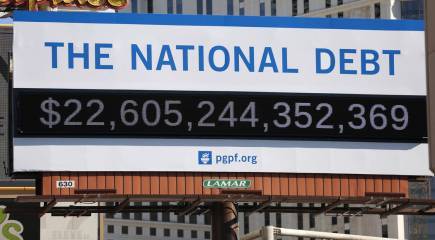EDITORIAL: Trillion dollar deficits should be raising alarms, not eliciting yawns
The federal budget deficit is reminiscent of the dangerous housing bubble in the mid-2000s: Most observers know the situation is going to end poorly, but there’s little appetite for proactive measures to ward off future hardship.
The federal deficit for the past fiscal year was almost $1 trillion. This year, it is projected to surpass that milestone and reach $1.5 trillion in 2028. Less than a decade ago, Republicans roundly and correctly criticized President Barack Obama for running trillion-dollar deficits. Now, few in either party are interested in talking about the looming fiscal trainwreck.
It’s tempting to ignore the issue because the economy is humming. The unemployment rate is near record lows. The stock market is near record highs.
During previous periods of economic growth, these factors would have decreased the deficit. During Mr. Obama’s first three years in office, the annual deficit was around $1.3 trillion. That was due to the Great Recession and the stimulus bill he pushed through in 2009. When he left in 2016, the deficit was $585 billion. Three years into President Donald Trump’s administration, the deficit has again ballooned to almost $1 trillion.
Democrats blame the 2017 tax cuts pushed through by Mr. Trump and Republicans. Government, however, doesn’t have a revenue problem. It has a spending addiction. Unlike past Republican leaders, such as former Speaker Paul Ryan, Mr. Trump hasn’t been interested in spending restraint. He’s happily traded an increased military budget for higher domestic outlays.
Reforming entitlements is no longer part of the national conversation. Mandatory spending, including Social Security and Medicare, makes up 60 percent of the budget. Over the next decade, obligations on Social Security, Medicare and interest on the national debt will account for 82 percent of new spending. Leading Democrat presidential candidates actually want to make the system more generous, raising taxes to fund the expansion.
“High and rising federal debt increases the likelihood of a fiscal crisis,” the Congressional Budget Office wrote in a report earlier in this year. If investors lost confidence in the U.S.’s fiscal position, it could drive up interest rates substantially, straining banks, pensions and insurance companies.
“A fiscal crisis could thus lead to a financial crisis,” CBO warned. “Because the United States plays a central role in the international financial system, such a crisis could spread globally.”
According to The Daily Beast, the resulting deficits don’t concern Mr. Trump because he won’t be in office when the crisis point hits. The rest of us, however, still plan to be here. That’s why elected officials should be addressing this problem now, instead of waiting for the bottom to fall out.






















